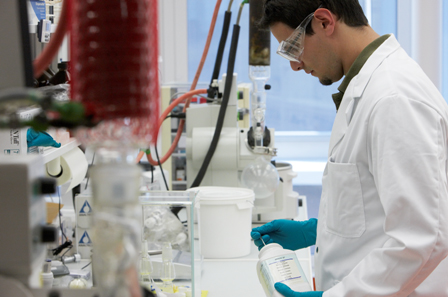The Modern Relevance of Fundamental Biomedical Research

By: Natalie Dixon
With the economy still in a fragile state in the United States as well as around the world, the government authorities have attempted to reduce the budget in any way possible. Healthcare is an often-overlooked portion of the annual expenditure in America, with the total expenditure per person close to $9,000. That brings the country’s total cost to around $2.8 trillion, or over 17 percent of the Gross Domestic Product. Why do these numbers matter? At this time, money matters more than anything, and any way to save money in the long run should be evaluated on a grand scale.
An article from Associated Press in 2005 states that six cents of every dollar spent in healthcare goes to medical research. Generalized to all spending, one cent of every dollar spent by Americans will be used to fund biomedical research. While this may seem like a large amount of money, we must consider the context in which it will be used.

Photo credit: Novartis AG / Foter / CC BY-NC-ND
Each day new diseases and varieties of known diseases are being discovered, and this variety gives rise to an even greater diversity of topics in the research sector. Research can be considered pharmacological, in a search for a new drug to treat a given illness, or basic, in a search to determine the mechanism through which a disease acts and its underlying cause. Both types of research are extremely costly, with clinical trials being the most expensive stage. Pharmacological research is advantageous because it often quickly gives rise to a functional drug that can be marketed and sold with minimal input on behalf of the company. Basic research, on the other hand, is advantageous because it determines the knowledge to formulate a permanent cure for the disorder; but it is extremely time consuming and costs more in the long run for the developing company.
Though these costs seem straightforward, the story changes when one takes into account the ongoing cost in the healthcare system for care of a chronic disease. When new drugs are developed, they may treat the disease and increase patients’ quality of life, but drugs usually do not provide a solution for a disorder, leaving the person to continually pay for treatment for the remainder of their life. Basic research, however, is costly at first but in the long run is more beneficial for both the individual and the healthcare system overall because treatments and costs will be nonexistent or much less frequent. Also, instead of dreading a life full of treatment the patient will have a better overall quality of life.
In order to receive a more informed opinion on this subject, I interviewed a pharmacist from Kroger pharmacy, Dr. Lucinda Dixon, who deals with both old and new drugs on a daily basis and must remain up to date on current research in order to be able to complete her job competently and provide the best medical opinion regarding patients’ treatments.
Natalie Dixon: On average, how many new drugs in a year are approved to be prescribed and how many do physicians actually prescribe?
Dr. Dixon: I would say a little over 20 new medications are approved by the FDA for use each year, and physicians usually prescribe about half of those consistently if the medications are relevant in their specialty.
ND: Do you think the quantity of new medications serve to better our healthcare system and individual treatment?
Dr. Dixon: I think the new drugs that are developed have fewer adverse side effects and drug interactions than older medications. Many of the new drugs treat the medical condition by a specific mechanism of action therefore producing results superior to previous medications.
ND: In your opinion, would it be more beneficial to continue to focus on drug development research or shift the focus more towards basic biological research?
Dr. Dixon: Biomedical research is important to finding cures for disease but we still need to continue new drug development to improve patient treatments. With the ageing population the need for medications is only going to continue to rise. We need to develop new medications to improve quality of life for as many patients as possible.
ND: Based on your daily interaction with insurance and medicine, which method would be more expensive in the long run?
Dr. Dixon: With the cost of developing a new drug exceeding $359 million, the cost of medications continues to rise but I feel that is still more cost efficient than biological research, which would then have to be further applied to drug research in order to be applicable for treatments. However, if a cure is found for a disease then that would be the most beneficial treatment route for a patient.
ND: Have you ever experienced a problem with a research finding about a mechanistic pathway in a disease that cannot be applied relevantly in medicine?
Dr. Dixon: I have not heard of a relevant research finding that cannot be applied in some way to current medical practice, but I am sure that it has occurred in the history of research with the variety of research currently conducted. There are many known disease pathways that are untreatable by medications so any findings related to a condition of this nature would not be applicable to the medical field.
